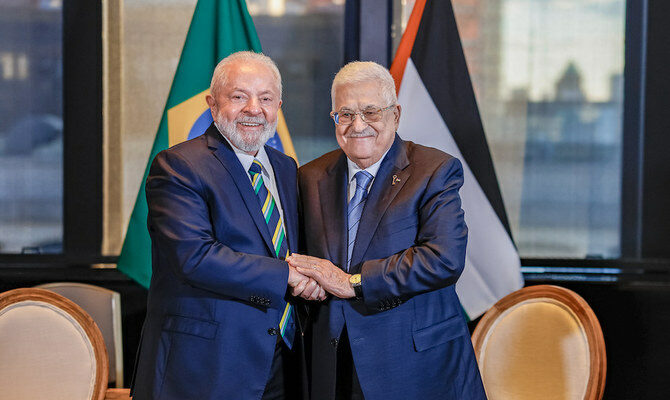The diplomatic relations between Brazil and Israel were established in 1949, shortly after Israel’s independence. Initially, the relationship was cordial, with cooperation in various fields, including agriculture, technology, and defense. However, Brazil’s historical support for Arab causes and its commitment to multilateralism often strained its ties with Israel.
Ups and Downs in Relations:
- Military Ties: During Brazil’s military dictatorship (1964-1985), military cooperation between Brazil and Israel flourished, with Israel providing military training and equipment to Brazil. However, this cooperation waned after Brazil transitioned to democracy, as successive Brazilian governments sought to distance themselves from the military regime’s policies.
- Diplomatic Relations: Brazil’s support for the Palestinian cause has led to strained relations with Israel at times. For example, in 2010, Brazil recognized the State of Palestine based on its pre-1967 borders, leading to a diplomatic row with Israel. Despite these tensions, bilateral trade and cultural exchanges between the two countries continued to grow.
- Economic Cooperation: Brazil and Israel have maintained significant economic ties, particularly in agriculture and technology. Israeli companies have invested in Brazil’s agriculture sector, while Brazilian firms have sought Israeli expertise in water management and agricultural innovation. However, political differences occasionally overshadowed these economic partnerships.
Background Analysis of Brazil’s Support for Palestine:
- Historical Solidarity: Brazil has a history of supporting decolonization movements and self-determination for oppressed peoples, stemming from its own experience with colonization and dictatorship. This historical solidarity with the Palestinian cause influences Brazil’s foreign policy stance on the Israeli-Palestinian conflict.
- Domestic Politics: Brazil’s support for Palestine is also influenced by domestic political considerations. The ruling Workers’ Party (PT) and left-wing political groups in Brazil have traditionally championed the Palestinian cause, aligning with public opinion and grassroots movements that support Palestinian rights.
- Multilateral Diplomacy: Brazil emphasizes multilateralism and adherence to international law in its foreign policy approach. By supporting Palestine, Brazil aligns itself with the broader international consensus on the Israeli-Palestinian conflict, advocating for a two-state solution based on UN resolutions and the rights of Palestinians.
- Economic Interests: While Brazil’s support for Palestine is primarily driven by political and ideological considerations, there may also be economic motivations at play. Brazil has sought to strengthen economic ties with Arab countries, many of which support the Palestinian cause. Maintaining good relations with these countries can be strategically important for Brazil’s economic interests in the Middle East and beyond.
Conclusion:
Brazil’s decision to support Palestine over Israel in the Israeli-Palestinian conflict in 2023-2024 reflects a combination of historical solidarity, domestic political considerations, adherence to multilateral principles, and strategic interests. While this stance risks straining Brazil’s relationship with the USA and Western powers, it underscores
The diplomatic relations between Brazil and Israel were established in 1949, shortly after Israel’s independence. Initially, the relationship was cordial, with cooperation in various fields, including agriculture, technology, and defense. However, Brazil’s historical support for Arab causes and its commitment to multilateralism often strained its ties with Israel.
Ups and Downs in Relations:
- Military Ties: During Brazil’s military dictatorship (1964-1985), military cooperation between Brazil and Israel flourished, with Israel providing military training and equipment to Brazil. However, this cooperation waned after Brazil’s transition to democracy, as successive Brazilian governments sought to distance themselves from the military regime’s policies.
- Diplomatic Relations: Brazil’s support for the Palestinian cause has led to strained relations with Israel at times. For example, in 2010, Brazil recognized the State of Palestine based on its pre-1967 borders, leading to a diplomatic row with Israel. Despite these tensions, bilateral trade and cultural exchanges between the two countries continued to grow.
- Economic Cooperation: Brazil and Israel have maintained significant economic ties, particularly in agriculture and technology. Israeli companies have invested in Brazil’s agriculture sector, while Brazilian firms have sought Israeli expertise in water management and agricultural innovation. However, political differences occasionally overshadowed these economic partnerships.
Background Analysis of Brazil’s Support for Palestine:
- Historical Solidarity: Brazil has a history of supporting decolonization movements and self-determination for oppressed peoples, stemming from its own experience with colonization and dictatorship. This historical solidarity with the Palestinian cause influences Brazil’s foreign policy stance on the Israeli-Palestinian conflict.
- Domestic Politics: Brazil’s support for Palestine is also influenced by domestic political considerations. The ruling Workers’ Party (PT) and left-wing political groups in Brazil have traditionally championed the Palestinian cause, aligning with public opinion and grassroots movements that support Palestinian rights.
- Multilateral Diplomacy: Brazil emphasizes multilateralism and adherence to international law in its foreign policy approach. By supporting Palestine, Brazil aligns itself with the broader international consensus on the Israeli-Palestinian conflict, advocating for a two-state solution based on UN resolutions and the rights of Palestinians.
- Economic Interests: While Brazil’s support for Palestine is primarily driven by political and ideological considerations, there may also be economic motivations at play. Brazil has sought to strengthen economic ties with Arab countries, many of which support the Palestinian cause. Maintaining good relations with these countries can be strategically important for Brazil’s economic interests in the Middle East and beyond.
Conclusion:
Brazil’s decision to support Palestine over Israel in the Israeli-Palestinian conflict in 2023-2024 reflects a combination of historical solidarity, domestic political considerations, adherence to multilateral principles, and strategic interests. While this stance risks straining Brazil’s relationship with the USA and Western powers, it underscores Brazil’s commitment to justice, self-determination, and international law in addressing one of the most complex and longstanding conflicts in the Middle East. As Brazil navigates the geopolitical dynamics of the region, it must carefully balance its support for Palestine with its broader diplomatic and economic interests on the global stage. As Brazil navigates the geopolitical dynamics of the region, it will be interesting to see how it balances its support for Palestine with its broader diplomatic and economic interests on the global stage.


